Undergrads in Bioimaging REU Experience What Research, Graduate School Is Like
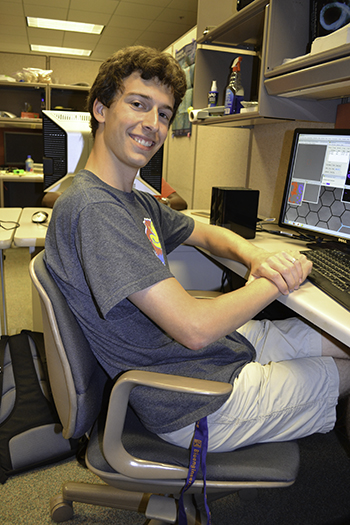
Bioimaging REU participant Matthew Kavanaugh.
July 29, 2016
Ten undergraduate students from around the country participated in the NSF-funded Bioimaging Research Experience for Undergraduates (REU). Working alongside researchers in Illinois labs, they discovered the exciting world of bioimaging research, got a taste of what graduate school is like, and some might have discovered what they want to do for the rest of their lives.
Matthew Kavanaugh
Take Matt Kavanaugh. The rising junior at the University of Kansas is majoring in Chemical Engineering with a concentration in Biomedical. While he has done research before in biomaterials at Kansas, he says it was very different from what he did here. Working in Bioengineering Professor Rohit Bhargava’s lab, Kavanaugh spent his summer training computers to diagnose breast cancer based on certain qualities, such as tumor grade and prognosis.
Based on his experience this summer, Kavanaugh feels he might be interested in cancer research as a career: “I can guarantee you that any work I do is going to be of value to someone…cancer is getting up there as a cause of death.”
A career in which he can make a difference is important to Kavanaugh: “I think that’s the primary criteria of any path that I choose. I have to make a difference and find a personal value in doing so. That would be the most important thing to me.”
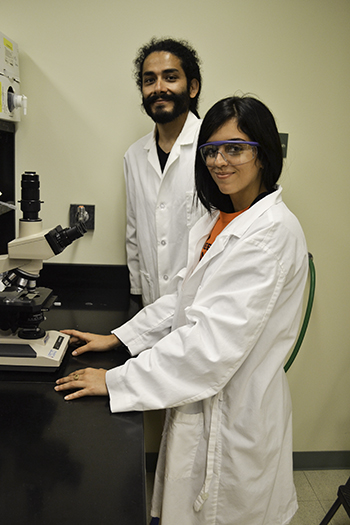
Left to right: Ph.D. student Javier Suárez and Bioimaging REU participant Denise Medina in Stephen Boppart's Biophotonics Imaging lab.
Kavanaugh believes that participating in this REU has had an impact on him in terms of whether graduate school and a career in research might be in his future. “It has definitely made grad school and a future in academia a very strong candidates.” Although he’s still exploring his options, the summer has had a major impact: “I really want to spread out and see everything, then narrow in and focus on what I want to do. And this has been one of those major paths that I had to get myself to look at, and it hasn’t been disappointing.”
Denise Medina
Another student making plans for graduate school and possibly even a career in research as a result of participating in the Bioimaging REU is Denise Medina, a rising junior majoring in Biomedical Engineering at Florida International University. Medina first visited Illinois last fall for the MERGE (Multicultural Engineering Recruitment for Graduate Education) program. And because she’s involved in research at her school, when she received an email about the Bioimaging REU, she decided she “wanted to go see different labs and different kinds of experiments. That’s why I applied. It was worth it.”
Working in Stephen Boppart’s Biophotonics Imaging Lab over the summer, Medina helped to develop an algorithm on the interconnection between neurons in a network. “We have different types of neurons, so we want to know the strength and connections between them,” she explains. “We apply light to the neurons, and we record video, and then we analyze. We can make a relationship and a correlation coefficient between each neuron depending on the intensity of the light.”
Medina says she learned a lot about computer algorithm development over the summer. “I had a very basic idea of how to control a program,” she says. “I’ve definitely learned a lot more. I don’t feel like I know everything, but I learned a lot.”
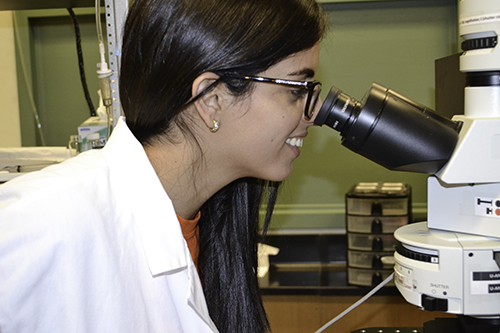
Bioimaging REU participant Denise Medina at work in Stephen Boppart's Biophotonics Imaging lab.
One source of support for Medina was her grad student mentor, Javier Suárez. “Javier, he’s helped me a lot. He taught me a lot. Every time I have a question about my code, he helps me understand and write it. Something that takes me like a day to write; he can help me write it in an hour.” She also had a chance to interact with her PI, Professor Stephen Boppart, whom she calls “a very smart and intelligent man.”
What other skills has she gained over the summer in addition to those she acquired doing neuron research? For one, Medina says she improved her communication skills—especially regarding how to give presentations that non-scientists could understand. “So people who don’t have an understanding in science can understand what I’m doing and saying. It helped me with that. It helped me with communication, with writing.”
The summer also helped her figure out “what I want to do in grad school. Now I’m thinking more about doing neuroscience,” she admits.
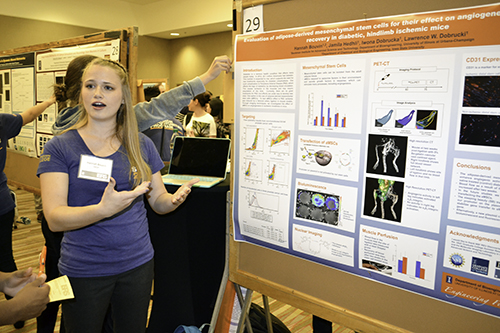
Bioimaging REU participant Hannah Bouvin presents her research during the Illinois Summer Research Symposium.
Does Medina think she’ll end up in research?
Oh, yeah, I think so,” she acknowledges. “Yeah. I like doing research.” Because she doesn’t really like to teach, she’s thinking about industry, although she thinks that maybe after being a TA in grad school, she might like teaching more. “But now, not right now,” she admits.
Medina reports that participating in the REU has definitely impacted whether or not she will go to grad school: “I’m really thinking about coming here for grad school now,” she admits. “The research here is very good.”
Hannah Bouvin
Like Medina, Hannah Bouvin, also wanted to experience a different kind of research. A junior in Chemical Engineering at Iowa State, Bouvin does biomedical research at her home institution. “I’m interested in research,” she says, “and I wanted to know what research was like in a different university.” Regarding the summer’s impact, she explains, “I didn’t know anything about bio imaging. I did a lot of different imaging, and learned a bunch of new skills.” She also gained another skill: “I was actually able to do surgeries on mice, which was really exciting!”
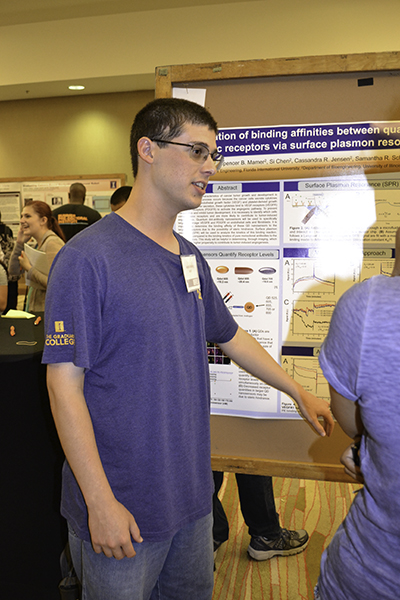
Bioimaging REU participant Jacob Erstling presents his research during the Illinois Summer Research Symposium.
Jacob Erstling
A rising senior at Florida International, Jacob Erstling is majoring in Environmental Engineering. His career goal is to go on and get a PhD, become a professor, and “do all that fun stuff.”
Erstling’s research was with quantum dots. “We determined that smaller quantum dot nano sensors were the best option for binding to receptors on cells so that we know which cells can cause tumors,” he explains.
Erstling definitely thinks he’ll end up in research. This summer was not his first research experience. But because the REU he participated in last summer wasn’t about imaging, he says that this summer, he “learned about a whole bunch of new techniques, especially bio imaging…and I learned a lot more about quantum dots as well,” he reports.
Sophie Xie
Sophie Xie is a rising junior at Vanderbilt University where she is majoring in Biomedical Engineering. She participated in the Bioimaging REU because it gave her an opportunity to work full time on a research project. “I work at a lab back at school, but there I have to balance classwork as well as an entire project. This gave me the opportunity to see a project from the beginning to the end. And it’s nice to feel like a grad student over the summer and see the progression of the project, rather than just going to the lab a couple hours a week like at Vanderbilt.”
Xie learned a lot of new lab skills over the summer: how to analyze data and how to approach problems. “There were a lot of road blocks in my project that I had to overcome and try new things. It was interesting to be in that situation to change and communicate with my lab members to figure out what was wrong.”
Xie believes a career in research is definitely a possibility. “I still have two more years, so I will be looking at some industry opportunities as well, but this is definitely a possibility.”
She reports that the experience definitely gave her a feel of what grad school is like: “There were some days when I was in the lab till 10 PM. So I think that is a good indication,” she explains.
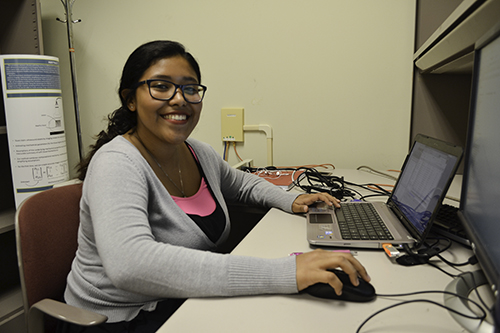
Bioimaging REU participant Wendy Reyes at work in Insana’s Ultrasonic Imaging Lab in Beckman.
Wendy Reyes
When rising junior Wendy Reyes spent the summer doing research in Professor Michael Insana’s Ultrasonic Imaging Lab as part of the 2016 Bioimaging REU, she learned a lot. She learned some research skills: how to train software to recognize cancer in the images of breast tissue. She learned some life skills: how to become more organized, to be proactive and not procrastinate, and to overcome her timidity and be bold in seeking assistance. She also learned some things that might be related to her future career: how to apply to grad school, and that she likes research and might want a career in it.
Along with the many skills Reyes learned while participating in the Bioimaging REU this summer, she also learned that she enjoys research. “At first, I came here to just learn. But now, towards the end, I don’t know what I would do besides research. I like coming up with my own problem and thinking about how to solve it. That aspect I really like about it. If I pursued a PhD, I would also like to teach and help other students find passion in research. I didn’t know a lot about what goes into creating a research project, but now I have a better understanding of it. I want to go into research. I like it, and I think it’s worth it.”
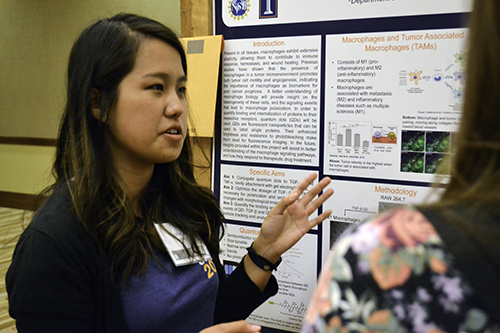
Bioimaging REU participant Sophie Xie, a rising junior at Vanderbilt University, explains her research to a visitor during the Illinois Summer Research Symposium.
Author/Photographer: Elizabeth Innes, Communications Specialist, I-STEM Education Initiative
For more related stories, see:
BioE, Funded, REU, REU: Bioimaging, Summer Research Programs, Undergrad, 2016
For additional istem articles about summer 2016 REUs, see:
- POETS REU Helps Illinois Undergrad Sabrina Yin Choose Her Career Path
- Undergrads Consider Nanotechnology Careers Thanks to nano@illinois REU
- Bioimaging REU's Matt Kavanaugh Experiences Cancer Research at Illinois
- Wendy Reyes Learns Life Skills—and to Like Research—in Bioimaging REU
- 2016 Chemistry REU Offers Undergraduate Students a Glimpse of Grad Life













.jpg)
















